
Weeding instead of chemical destruction, collecting pests, attracting beneficial insects: Natural pesticides are better – for people and the environment. We show you how to protect your plants from pests in a natural way.
Synthetic chemical plant treatments are generally taboo in organic gardens – because they pollute groundwater, threaten biodiversity and harm the health of humans and animals.
They are not even necessary to protect plants against pests:There are numerous natural plant protection products, such as nettle liquid manure or neem oil, that do this naturally. In addition, there are preventive measures that prevent pest infestations from occurring in the first place; these include good soil preparation, resistant varieties and proper fertilization.
Contents
Natural plant protection through prevention
Already during the preparation of the beds and planting itself, you can do a few things to prevent pest infestation in the first place. Depending on how much space you have available for tomatoes, cucumbers or potatoes, you need to take different measures.
If you plant your vegetables on the balcony, you should make sure that the irrigation water can drain off well so that no waterlogging occurs. Most plant pots have a drain for this purpose. (Plant tubs** are available on Amazon, for example).
On the other hand, if you have a large garden, you should choose a place for planting where the plants are not exposed to competition from trees and they do not get too much shade.
Finally, prepare the soil well to preventively protect the plants from pests: Loosen the soil to allow air, light and heat to penetrate – this will help the plants get the nutrients and water stored in the soil.
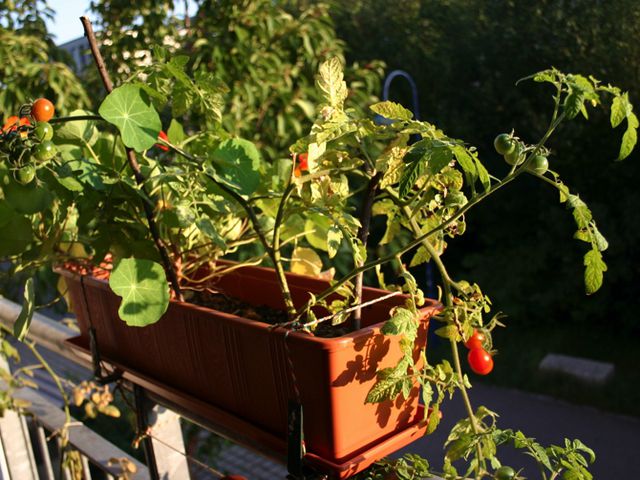
Preventive measures: Resistant varieties, mixed cropping and proper crop rotation.
- Resistant varieties: Diseases, such as blight in tomatoes, can be avoided by using resistant varieties. Additionally, if you don’t have a greenhouse, make sure when buying that the plants are suitable for outdoor use.
- Mixed culture: there are some plants that each keep certain pests away. Therefore, mixed cultures are useful, where different plants are planted together: Chervil, for example, helps against ants and slugs; garlic and onions repel carrot flies. Ultimately, mixed culture promotes soil life, there is more yield in a smaller area, and the soil is constantly shaded. In balcony boxes, however, mixed crops should be rather avoided.
- Fruit rotation: In balcony boxes, you can pay attention to a well thought-out fruit rotation, so that the plants are equipped against pests from the outset. Crop rotation simply means that you systematically and successively plant different plants on the same soil or in the same soil. In this way, you ensure that the soil is not depleted. Information on how to achieve a well thought-out crop rotation can be found, for example, in the book “Selbstversorgt, das Startprogramm für Einsteiger” (for sale** at Buch7 or Buch.de).
- Beneficial insects: In a large garden, you can attract beneficial insects such as ladybugs, earwigs or predatory mites better than on the balcony. These naturally protect plants from pests such as aphids or spider mites. Plants that attract beneficial insects include wild herbs, marigolds and cornflowers. Insect hotels, piles of leaves and watering holes also attract beneficial insects. In general, you should plant the garden as varied as possible with flowers, perennials, wild herbs and fruit trees and avoid excessive garden cleanliness.
- What soil? A healthy diet is not only important for us humans: for plants, compost is particularly important. Where this is not available, e.g. on the balcony, you should provide your plants with peat-free organic soil, which is especially suitable for herbs and vegetables. The top layer should be changed every year.
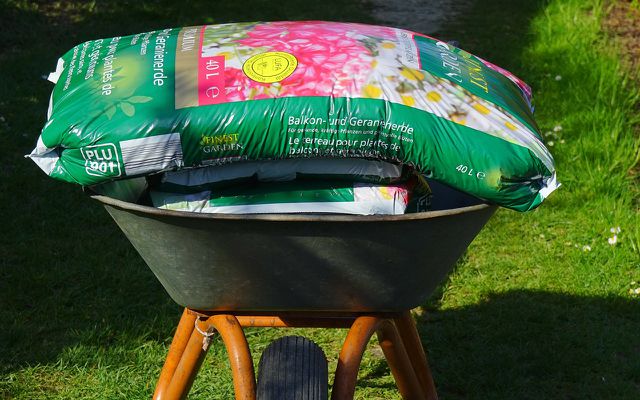
- Fertilizing: Proper fertilizing can also prevent pest infestation of plants in advance. The following applies: Fertilize sufficiently, but do not overdo it. Fertilizer contains nitrogen, which makes plant cells thinner and makes it easier for fungi or pests such as aphids to attack the plant. In the garden, you can determine the need for nutrients by taking soil samples. You can strengthen plant cells specifically with silica from horsetail tea. Nettle liquid manure also strengthens plants. Since it has a strong odor, it is recommended for the garden rather than the balcony. Click here for the recipes.
Combat pest infestation with natural plant protection products.
Sometimes nothing helps, despite the best preparation, pest infestation occurs. Then there are natural pesticides that help.
Natural pesticide against aphids
Often it is enough to spray the plants with warm water and a splash of neutral soap. In doing so, the neutral soap ensures that the water sticks to the animals.
An extract of nettles works even better against aphids. Unlike the nettle liquid manure, this one does not stink and is easier to prepare: You let the herbs steep in cold water for 12 to 24 hours and then pour the whole thing through a sieve.
Neem oil (also known as neem oil) is a pest control agent that is non-toxic to humans and animals. In the trade, you can either get it in pure form to mix yourself or buy it directly as a finished product.
If it must go once fast: A bee-friendly pesticide is Neudosan aphid-free on the basis of potash soap (to buy** for example at Amazon).
In this article we have again summarized in detail how you can fight aphids with natural plant protection: Fighting aphids: helpful home remedies.
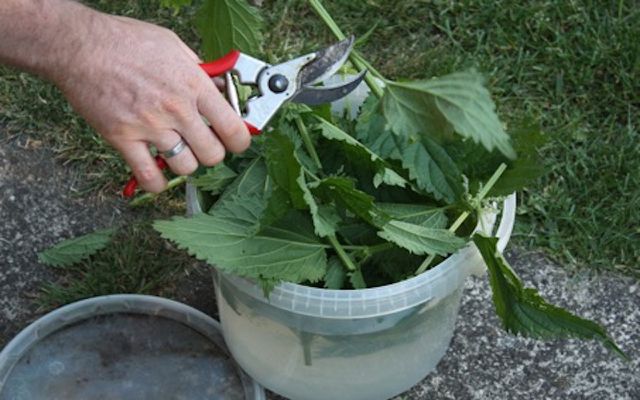
Natural plant protection product against spider mites.
In summer, spider mite infestation often occurs in greenhouses or on hot balconies. The plants are then covered with fine webs that resemble spider webs. The pest colonizes the underside of the leaves to gradually suck the plant dry. A few simple measures can prevent or at least counteract the infestation.
Spider mites depend on a dry environment, so to prevent dryness water the plant generously and also spray the leaves with water.
A mulch blanket of bark, straw or stone further prevents the plants from drying out.
Spraying with warm water to which a sip of milk has been added in addition to neutral soap also helps.
Neem oil products also help with more severe infestations.
Natural pesticide against fleas
Ground fleas are small beetles that prefer to infest cruciferous vegetables such as radishes and arugula. An infestation can be recognized by small, round holes in the leaf.
- Ground fleas like it dry. An infestation can therefore be counteracted with generous watering and spraying. On the balcony, you can use mulch to ensure that the plant containers do not dry out too much.
- Tea made from bracken or neem oil products also helps against the pests.
- A slurry or tea made from onions and garlic naturally repels ground fleas; simply spray on the affected plants.
- The earth flea prefers quiet, so regular hoeing and weeding will also drive it away.
- In the natural garden, beneficial insects such as hedgehogs, ground beetles, ichneumon wasps and shrews can protect the plants.
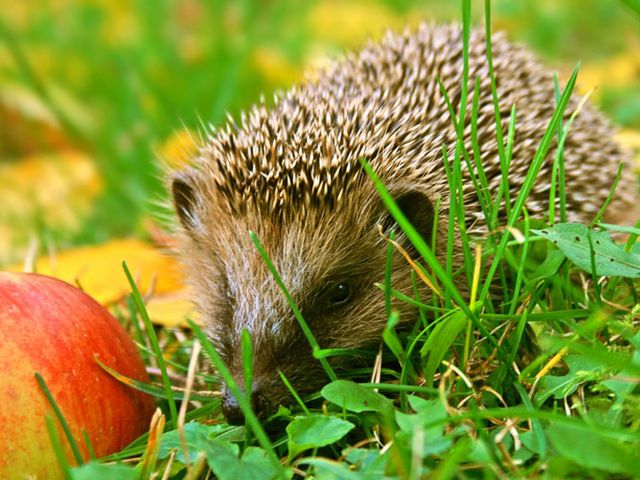
Natural pesticide against cabbage white butterflies
Anyone who grows cabbage has probably observed how the cabbage white butterflies flutter around it to find a good place to lay their eggs. The result is then less appetizing caterpillars on broccoli, cauliflower, etc.
- On small, manageable cultivation areas – such as the balcony – a vegetable net is the best means of defense, or you can also crush the clutches by hand or collect the caterpillars.
- In the garden, it is better to leave this work to the birds and offer them birdhouses for this purpose.
- From the side shoots of tomato plants you can produce a broth for spraying.
- If you want to use a ready-made product, buy the caterpillar spray from Neudorff. The active ingredient is the bacterium Bacillus thuringiensi, which attacks the caterpillars but is not harmful to humans or beneficial insects. (Buy**: for example at Amazon)
- All agents should be applied in the early stages, when the caterpillars are still sensitive.
Natural pesticide against slugs
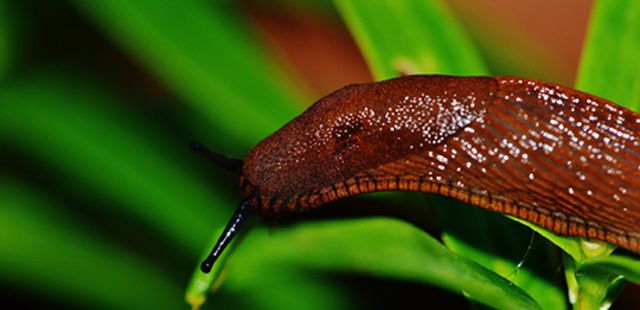
Snails are not only a problem in the garden, without further ado they also make it to the balcony – and usually let themselves taste more than one head of lettuce. The best thing to do here is to lay out traps and collect them.
- To do this, lay out a board or a cardboard box, moisten the ground underneath and add some cat food or a potato slice as an attractant. A few hours later you can collect the culprits.
- In the garden, you can also collect the pests or put up slug fences. (Buy**: for example at Amazon)
- A completely new method is nematode control: Threadworms, which you buy in subscription and apply at regular intervals, penetrate the pest and decompose it from the inside.
- Recipes for natural pesticides
- Tea from field horsetail as a fertilizer:
- Soak 60 grams of dried (from the pharmacy) or 500 grams of fresh herb in 3 liters of water for 24 hours. Simmer for one hour, cool and strain. Dilute in a ratio of 1:5 and water the young plants with it repeatedly.
- Nettle extract against aphids:
- Collect 500 grams of fresh nettle before flowering in a full sun location (alternative 70 grams of dried herb), cover with 5 liters of water and steep covered for 24 hours. Strain and spray the plants several times on consecutive days. Do not forget the undersides of the leaves!
- Water-milk mixture against pests: dilute milk and water in the ratio 1:8 and add a small splash of neutral soap (alternatively a few flakes of curd soap). Spraying should be repeated at intervals of one week each until no more infestation is seen. With milk the effect is even stronger than with pure water, the mixture should even help against mildew.
- Nettle liquid manure: Pile about a kilo of fresh nettles into a large plastic or wooden tub. Place the container in a sunny spot, pour about ten liters of water on the nettles and cover. Depending on the weather, the broth must now ferment for about two weeks. Once a day you should stir the whole thing.

